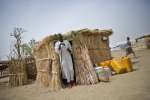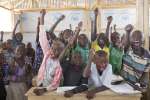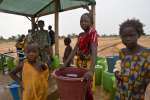UNHCR chief seeks more international support to solve the Somali refugee situation
News Stories, 7 October 2011
GENEVA, October 7 (UNHCR) – UN High Commissioner for Refugees António Guterres wrapped up the annual meeting of UNHCR's governing Executive Committee, or ExCom, on Friday with a fresh call for international support to find a solution to the plight of Somali refugees.
He also told delegates that UNHCR was looking at what kind of "catalytic" role it could play in finding solutions to the long-running Somalia refugee crisis, which has been exacerbated this year by drought, famine and the continuing fighting in the south and centre of the country. More than 900,000 Somalis are now refugees in neighbouring countries and some 1.5 million are internally displaced.
Guterres indicated that areas the international community could look at included increased burden-sharing and support for host countries and communities, including economic development.
"Those communities are paying a high price supporting refugees and they need solidarity and burden-sharing in relation to their own economic and social development needs. And that is why it is so important that development cooperation becomes a key instrument in the solutions for refugee problems," he said.
But he also noted that "it is necessary to recognize that the capacity to coordinate between the UN system and international financial organizations is still in its very beginning. And the capacity of coordination of multilateral actors with bilateral forms of cooperation has also still a long way to go."
Looking ahead to 2012, the High Commissioner said: "I think we should do our best to concentrate our efforts next year on protracted refugee situations, on urban refugee problems and in addressing the protection gaps [in education, health and other areas] in this complex movement of people that we are witnessing, and develop the forms of burden-sharing that are necessary."
At a post-Excom press conference, Guterres referred positively to a new political road map on Somalia that had emerged from a High Level Consultative Meeting in Mogadishu in early September, and also spoke of the need for better equipping of African Union Mission in Somalia (AMISOM) peacekeepers.
"I gave two suggestions. First, nurture this political process that is now being born to avoid that it has the same destiny as others in the past," he said. "Second, make AMISOM an effective and operational force according to its mandate. It doesn't make sense to approve the mandate in the [UN] Security Council and then not to provide the instruments that are needed. And the costs are ridiculous compared with the costs of military presences in other parts of the world."
The annual ExCom meeting reviews and approves UNHCR's programmes and budget, advises on protection issues and discusses a wide range of other topics. Tunisia's Acting President Fouad Mebazaa was the guest of honour at this year's meeting, which saw Sweden take over chairmanship from Egypt.









































